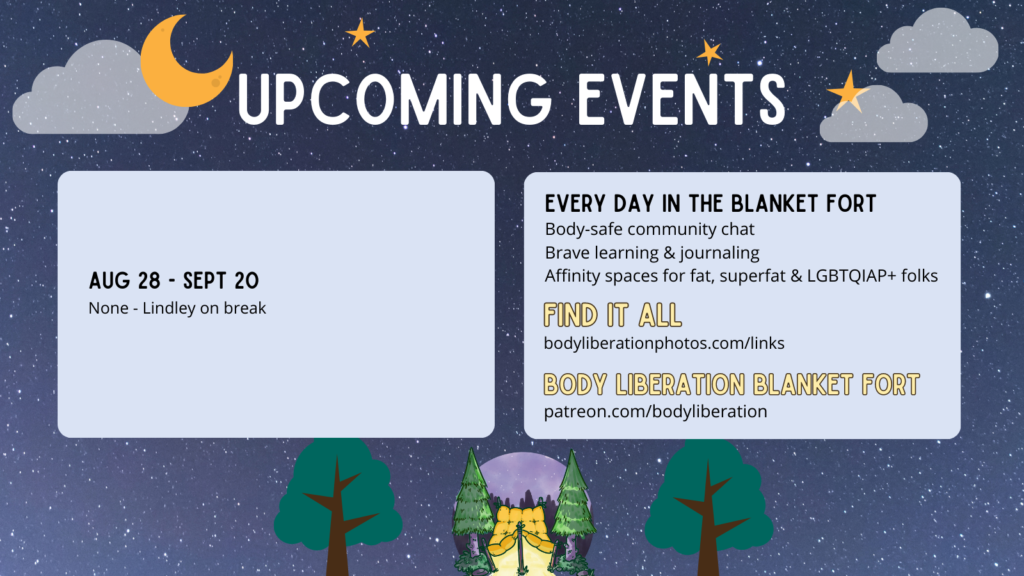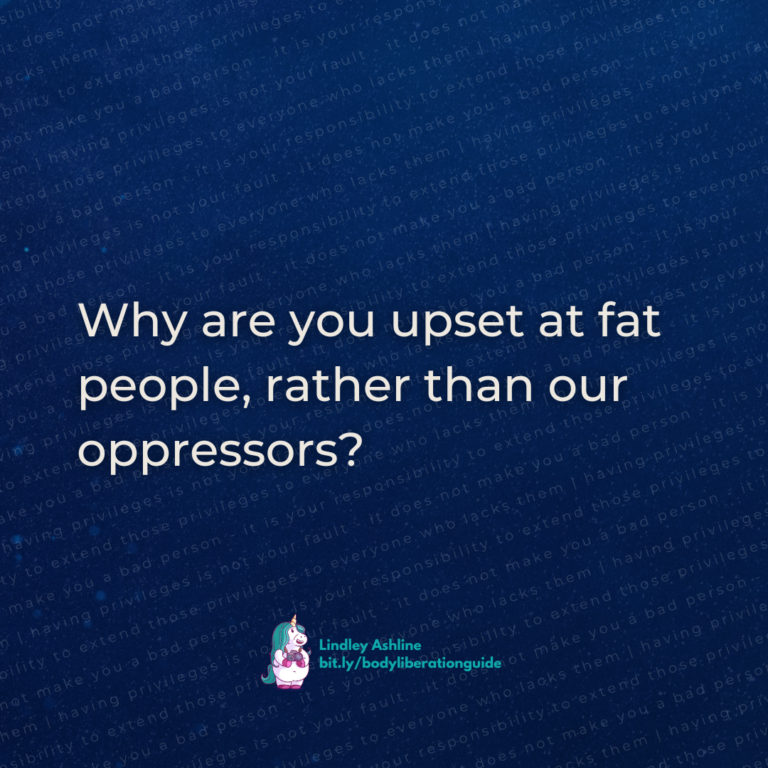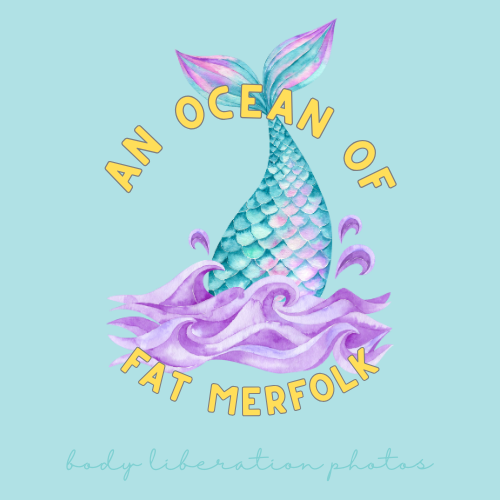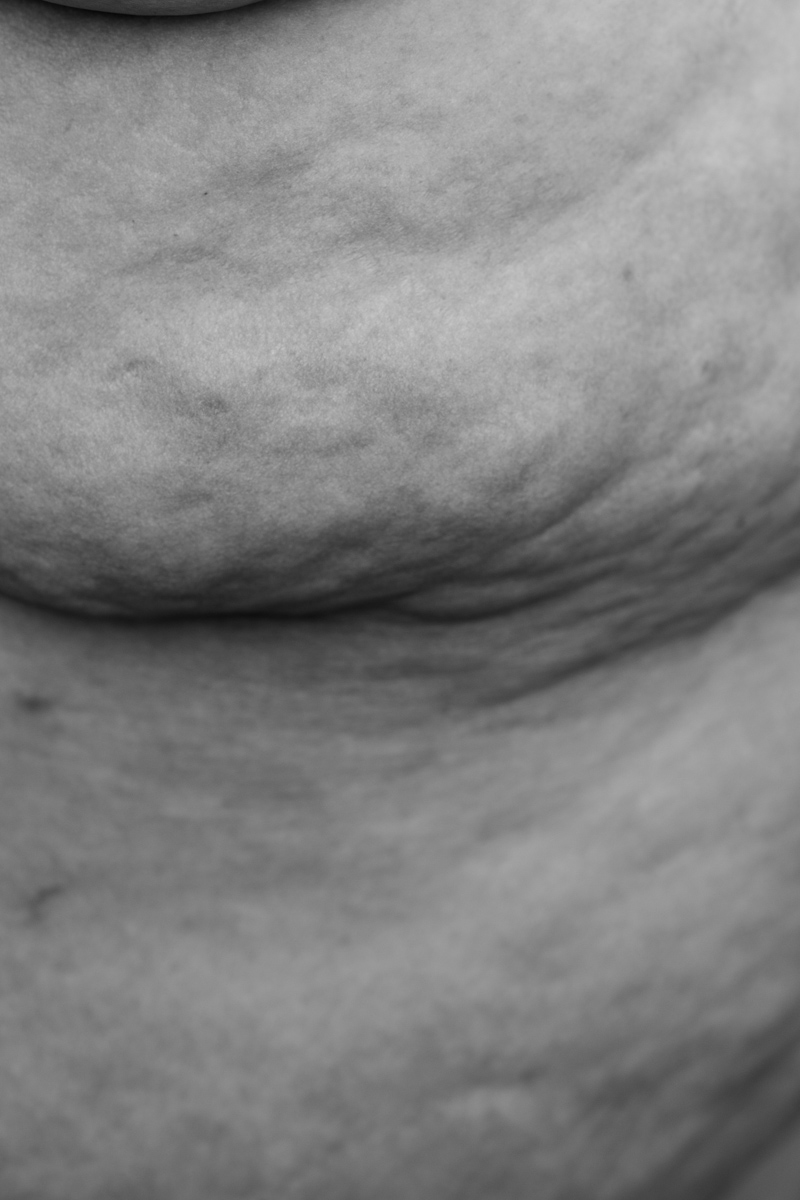{The Body Liberation Guide} It’s time for me to tap the sign
Client M. and their incredible sleeve tattoo. I’m currently booking boudoir & portrait photo sessions»
Before we get to it, I have an extra unicorn chaser for you this week! Blanket Fort member Jeri Lynn is hosting an adorable batch of foster kittens and running a live cam so we can all enjoy their precious floof.
Also, I was mentioned in this handy article on 9 Ways to Make Your Business More Size-Inclusive.
Whenever I run a multi-week series here in the guide, like our current discussion of the sources of weight stigma, it often gets interrupted by current events.
That’s the case this week, where here in the U.S. Donald Trump’s mug shot and accompanying justice system booking information are hot news…
for his stated weight.
Yep, that’s right. A large part of the chatter right now consists of gleeful, smug chatter about Trump’s fatness, as if we don’t have better things to discuss. With that in mind, I’m sharing this set of common objections and responses that I wrote in 2020.
“He’s a terrible person, he deserves to be made fun of.”
When you use public figures’ body size or appearance (yes, even the fake tan. yes, even whatever attribute you think is funniest. yes, even when the public figure is truly horrible.) as an insult, that person will never hear you or be affected by it. But your fat friends and your friends who don’t perfectly match cultural beauty standards (that’s all of them, and probably you, too) will hear it, and they’ll know what you really think about them and their bodies.
“But when I make fun of Trump, I’m not talking about YOU, fat friend.”
See above, my friend.
“But I don’t consider fat or o* to be an insult when I’m talking about YOU.”
Then why is it suddenly an insult when it’s describing someone you don’t like? Either fatness is bad or it’s not.
“Fine, I won’t talk about his weight, but his tan is so fake and bad!”
Weight stigma isn’t the only -ism out there.
“But it’s practically makeup!”
Where do we learn that men wearing makeup is bad and worthy of ridicule? Why do we consider women who don’t wear makeup to be mannish, and men who do to be sissies? The patriarchy, which teaches us gender roles and enforces toxic masculinity.
“But they don’t even match his skin tone, it’s ridiculous.”
Where do we learn that there is a narrow range of makeup application and technique that looks “right” and that anything outside that is wrong? Why is a dramatic cat-eye (on a person with the appropriately feminine gender presentation) admirable, where a kabuki mask of spray tan is laughable? Why is a (young, thin, white) woman who’s been photoshopped into china-doll flawlessness #goals, but an older woman who’s put on way too much eyeshadow is a farce?
What is too little? What is too much? These opinions are so deeply ingrained in us that, like fatphobia, they can be really uncomfortable to pull out and examine. We know “too little” and “too much” when we see it because those rules have been ingrained in us, just like rules around food and bodies, from the time we could first absorb them in:
- Makeup and skincare ads
- The media, TV, magazines, movies
- Family and friends
- The beauty regimens of people around us
- Multi-level marketing makeup companies and reps
- Makeup tutorials
- Social media influencers
The current style is for makeup and other skin-altering substances to look “natural,” which as a photographer, I find pretty funny myself. (I assure you that flawlessly smooth skin with no acne, no wrinkles, no visible pores and no other marks is not “natural” at all for human beings.) So if Trump were to do his spray tan “right,” in a way where you didn’t notice the edges as much and the color were closer to his actual skin tone, he would more successfully comply with the current beauty standards.
And I can also assure you that beauty standards constantly shift, partly because it does entangle us in constant policing of ourselves and each other (and partly because it’s very, very profitable to create changing standards we must constantly buy more things to meet).
I assure you that if, at some point in the future, a person or company with enough power decides that it should be fashionable (and profitable) to wear hard-edged masks of heavy makeup, suddenly you’ll be looking just like Trump does today and scrambling to make those edges even more clear-cut with whatever tool is being sold to do it with.
But why are we, especially those of us who claim to be interested in ending oppression of all kinds, so tied up in current beauty standards in the first place?
Why are we doing the patriarchy’s work for it?
“Then what about his hair?”
Where do we learn what “appropriate” or “attractive” hair for men looks like? Where do we learn what is transgressive? Where do we learn that thinning hair and dyed hair and combovers are “bad?”
It’s toxic masculinity that teaches us that having hair that doesn’t match current beauty standards for men is not only wrong, but humorous. (Because, of course, having someone laugh at you feminizes you and removes your power.)
“Well, okay, but the well-done steak with ketchup thing is still pretty funny.”
*massages temples*
Okay. Let’s talk about classism. If you haven’t encountered the concept of classism, it’s “prejudice against or in favor of people belonging to a particular social class” according to the Oxford Dictionary. In the United States, at a cultural level, this is expressed as anything seen as “high class” being glorified and “low class” vilified. (Because, of course, we are all temporarily embarrassed millionaires.)
Classism infuses many of our beliefs about how we and others “should” act and look. To go back to Trump’s hair and tan for a moment: Beauty standards are deeply tied into class and class performance. Since wealthy people often have more resources to devote to meeting (and setting) beauty standards, we associate wealth and high class with:
- Thinness
- Able bodies
- Smooth skin
- Good hair that is smooth and shiny
- High-quality and well-cut clothing
- Well-done makeup
(See how many of the items in the list depend on you knowing it when you see it, or otherwise have value judgments attached in their very language?) And when we see someone, like Trump, who doesn’t perform his socioeconomic class “correctly,” we instinctively find it both wrong and hilarious. (See also: celebrity weight gain articles) But appearance isn’t the only place where class performance matters. Let’s talk about food. Whole volumes could be written about class performance and food, so let’s focus on two issues here: steak and ketchup.
“So what’s up with the steak?”
Steak is currently seen as a high-class food. (I say “currently” because, like beauty standards, fashionable foods change over time, too. The culinary field has a long history of taking poor-folks food and “elevating” it, often making it inaccessible to the people who survived on it in the process.) But well-done meat is a low-class marker.
Steak tartare? High class. Hamburger? Low class. The inherent class contradiction of well-done steak is what we find funny, because contradiction is a central element of comedy itself.
He’s super rich, but he does stuff that poor people do! He doesn’t even know any better! It’s hilarious! Get it?
“But steak gets all dry and tough and loses its flavor when you cook it that much. And putting ketchup on it messes with the flavor.”
How much of your disdain for well-done meat has to do with actual personal preference, and how much with your own performance of class?
What foods do you enjoy that others might consider not well prepared, or low class? Do you want people making fun of you about those?
Making judgment calls on other people’s food preferences is not okay, period. Not only because you’re enforcing classist standards on other people, but also because you’re stomping on people who have sensory preferences and issues around foods, people with different cultural heritages around food and people whose tastes are just different from yours.
Once again, you’re not punching up at Trump when you make fun of him. You’re punching down at all your friends and family who aren’t performing class as appropriately as you’d like.
“You’re going to tell me something about class and ketchup now, aren’t you?”
You betcha. While you’re already looking through a class lens, point it at the derision aimed at Trump’s choice of ketchup for his steak. Ketchup is low class, so his choice of it is, once again, failing to perform his class in an approved manner. (Both class and beauty dynamics are also deeply tied into racism. That’s not my lane, so I encourage you to seek out Black and BIPOC activists who are speaking about race and class.)
“Can I at least talk about him liking all that fast food?”
Do you hear yourself, friend? Rather than answer that I’m going to point you back to everything else I’ve ever written about fatphobia.
“But he lies about his weight and is clearly much fatter than he actually is.”
Well, first, you really can’t tell what someone’s weight is simply by looking at them. I weigh 270 pounds and I wear a Lane Bryant size 26/28. A friend of mine weighs almost exactly what I do and wears a size 16/18. But really, you have somewhere around 20,000 lies to choose from. Pick another one.
“But he’s got dementia, right? Can I talk about that?”
Why do you want to talk about this? Is it necessary? Can you do it in such a way that you are not, purposefully or inadvertently, increasing the stigma around aging and/or mental illness?
“Tiny hands? Dick joke?”
*level gaze*
“But he’s so mean and awful. He doesn’t deserve my respect or for me to go high.”
But your friends and family do.
“So there’s nothing I can talk about in relation to his body and preferences I can make fun of?”
Nope. Maybe investigate why you want so badly to do this. One reason we put other people down is to reclaim or generate power for ourselves, to get some of our own back. It’s a completely understandable human impulse, but it’s also an impulse that in circumstances like these directly contributes to the marginalization and oppression of fat folks, women, poor people, people with mental illnesses and other already-marginalized people.
Remember when you’re trying to reclaim power from public figures by recreating oppressive dynamics that those public figures will never see or care what you think. You have no interpersonal dynamic or power with that person. They probably don’t even know who you are.
The people who will see and care are the people you care about.
And if you’re willing to intentionally smear more oppression all over them to gain a little bit of power yourself, well, please seek therapeutic help immediately because if you know better and refuse to do better, you need help before you continue to hurt others.
“Then what am I supposed to talk about?”
There are entire catalogs of truths to speak about Donald Trump that don’t involve his body size or his aesthetic choices or personal preferences. Maybe start with the children in cages. You don’t need me to list them for you.
Start with those. End with those.
Warmly,
Lindley
Changing the World is Up To You
It’s only possible to offer the Body Liberation Guide and all its labor for free because people like you support it. $1 USD per month helps out, and $5 and up gets you access to the full Conversation, full event listings, my body liberation library and more.
The Conversation
Here’s what’s being discussed this week in the world of body acceptance and fat liberation:
» When Fat Clients Don’t Fit on Your Massage Table (4 Tips) (featuring Lindley as the table model!) (watch)
» Sofie Hagen on the legacy of lockdown: I realised what the world feels like for thin people (read)
» Here are some ways in which covid has been used to relax regulations. (read)
» Call for survey participants (note that I’m not affiliated with these folks and haven’t vetted them) (see)
» Sign the Campaign for Size Freedom petition (sign)
» Responding to Weight Loss Recommendations (read)
» How Do I Describe Fat Characters Respectfully? (read)
» Poems of Black Fury And Abundant Fatness (listen)
 Unicorn chaser: Animal prints found in roof tiles of Florence’s cathedral dome (watch)
Unicorn chaser: Animal prints found in roof tiles of Florence’s cathedral dome (watch)
“I dislike ‘big’ as a euphemism, maybe because it’s the one chosen most often by people who mean well, who love me and are trying to be gentle with my feelings. I don’t want the people who love me to avoid the reality of my body.
I don’t want them to feel uncomfortable with its size and shape, to tacitly endorse the idea that fat is shameful, to pretend I’m something I’m not out of deference to a system that hates me.
I don’t want to be gentled, like I’m something wild and alarming. (If I’m going to be wild and alarming, I’ll do it on my terms.) I don’t want them to think that I need a euphemism at all.” » Shrill, Lindy West
Upcoming Events
- » NAAFA Webinar Series FLM Edition: Superfat Perspectives: Supporting the Fattest in our Communities Aug 29
- » Fat Liberation Month Finale Virtual Mocktail Hour Aug 31
- » Dancin’ Thru the Decades @ The Pinhook Sep 2
- » SXP200 – Small Business Fashion Production Sep 2 – Oct 27
- » Navigating Weight Stigma at the Doctor’s Office Sep 7
- » The Fat Therapist Gathering – Sep 11
Quick Resources: Sugar & Food Addiction
- » Sugar Addiction: A Summary Of The Science (Marci RD)
- » No, Sugar Isn’t the New Heroin (Traci Mann in Behavioral Scientist)
- » Body Image, Self Compassion & ‘Food Addiction’
- » Banning soda, sugary cereal or ice cream for your kids may not be the best strategy
- » Why Fear of ‘Sugar Addiction’ May Be More Toxic Than Sugar Is
- » more

Hi there! I'm Lindley. I create artwork that celebrates the unique beauty of bodies that fall outside conventional "beauty" standards at Body Liberation Photography. I'm also the creator of Body Liberation Stock and the Body Love Shop, a curated central resource for body-friendly artwork and products. Find all my work here at bodyliberationphotos.com.










